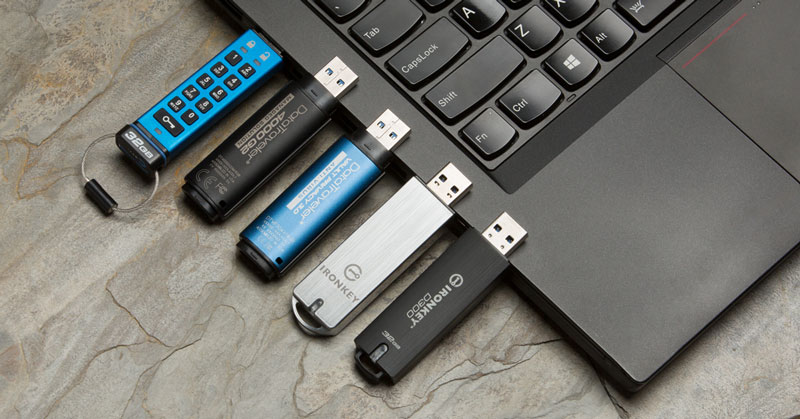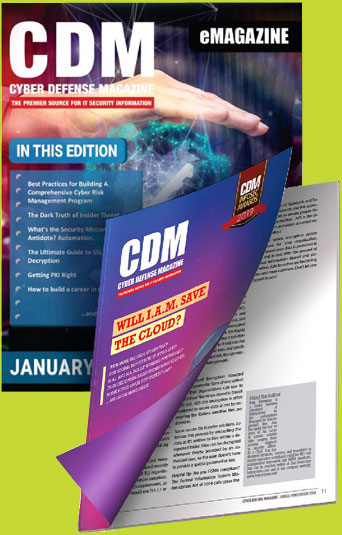And Often, More Secure
By Richard Kanadjian, Business Manager of Kingston Technology
If ever a year brought out the ‘can-do spirit’ in us humans, 2020 was it. The pandemic made people around the world adapt to changes on the fly regarding how they live, work and get through the day.
Maybe you are one of the millions of individuals who were thrust into working from home this year. Unless you were preternaturally gifted with in-depth knowledge of how all things digital work, you may have felt lost, bewildered and possibly terrified by all the changes. All of a sudden, you were your own mini-IT department. You were outside the traditional company firewall.
The thought of losing important company information may have kept you awake at night. You feared accidentally deleting countless files from the company server or opening a document, email or website that immediately infected every digital connection within the company.
But hey, it was 2020 andmost of the world’s business population probably felt the same way. You soldiered on. You survived. You got the job done.
One bit of IT knowledge you needed to grasp early on was saving and transporting data. Your home computer or digital device of preference wasn’t formatted or designed to save reams of information.
In one way or another, you discovered the cloud– a virtual means of storing an unlimited amount of data that was accessible anywhere you, your boss, fellow worker or company vendor was located and has an Internet connection.
Then, one day it dawns on you. The company only cares about you getting work done, not where you get it done. Pre-lockdown, the local coffee shop patio, bistro or bodega would make a fine open-air office, or so you thought.
But there in lies a potential major problem: you can easily be hacked at any of these locations when you try to access public Wi-Fi service to retrieve your Cloud-stored work. And when that happens, welcome back long, sleepless nights. Or IT concerns about data breaches outside their well-defended company firewall.
Fret not, my work-outside-the-home-home-worker. An encrypted USB drive is like having the Cloud in your pocket! And in most cases, even more secure.
For examples of such devices, I am going to present three of our Kingston encrypted USB drives. Each suited for a particular use case. One thing you will notice is each of these drives uses hardware-based encryption.
A USB can be encrypted using either the device’s hardware or software. Hardware-centric, software-free encryption is the most effective means to protect from cyber-attacks. It is an excellent, non-complicated, simple solution for protecting data from breaches, which should comfort both you and your boss.
Hardware-encrypted USB drives meet tough security standards and offer superior security to protect data, manage threats and decrease risks. They are self-contained and do not require a software element on the host computer. By eliminating the vulnerability created by software, users also eliminate the possibility of brute-force, sniffing, and memory hash attacks. Three things you don’t want to ever happen or be responsible for. If these drives are left somewhere or stolen, they hold on to their data with multiple security mechanisms designed to thwart attackers.
The first device is the DataTraveler® 2000 (DT2000). It is designed with an alphanumeric keypad that locks the drive with a word or number combination of your choosing for easy-to-use PIN protection.As it is operating system independent, it is a very versatile consumer solution, as you have so many choices these days when it comes to PCs (Apple, Chromebook, Windows) as well as tablets and smartphones.
DT2000 features hardware-based,full-disk AES 256-bit data encryption in XTS mode. That mouthful simply means the encryption is done on the drive with no trace of your PIN left on the connected system and provides a security level that the federal government and other such organizations and military around the world have adopted. The DT2000 also comes equipped with an optional Admin PIN feature that providesAdmin access to the drive and capabilities such as user PIN reset if the User forgets their PIN.
It also has FIPS 140-2 Level 3 certification to meet a frequently requested corporate IT requirement. So your mini-IT department is now functioning as the big boyswhilestill offering speedier data transfers. DT2000 can be used on any device with a USB 2.0 or USB 3.0 port, which includes virtually all digital devices in use today.
By the way, if you are working on a smartphone or tablet, you will be happy to know that the DT2000 will allow secure USB functionality for these devices. All you need is the right dongle accessory for USB-A. Or if you use an Android, you just need the right USB-C to A adapter.
Next is the DataTraveler Vault Privacy 3.0 USB flash drive (DTVP30). It provides affordable business-grade security (thanks to its 256-bit AES hardware-based encryption in XTS mode) that ensures 100% protection of stored data. Complex password protection with minimum characteristics helps prevent unauthorized access. Plus, for added peace of mind, the drive locks down forcing a reformat after 10 incorrect password attempts.
Your boss will be glad to know that it can be customized in various ways to meet internal corporate IT requirements, in addition to its FIPS 197 certification and being TAA compliant (often required for government security). DTVP30 meets frequently requested corporate and government IT requirements. It’s SuperSpeed USB 3.0 technology means you will not be compromising transfer speeds for security.
When a more advanced level of security is needed IronKey drives area go-to, one such drive being the D300S. Again, with FIPS 140-2 Level 3 certification and 256-bit AES hardware-based encryption in XTS mode, D300S provides physical security as well with its zinc casing and tamper-evident epoxy seal. Additionally, it offers award winning features like unique serial-number and barcode printed on drive to better aid network admin when deployed to the workforce. As well as a virtual keyboard enabling users to enter password via mouse clicks to reduce the risks of keylogging when not working on own system. Also available in a Managed model allowing central management of drive access and usage across thousands of drives.
Enjoy working from homeand enjoy the peace of mind that comes from using an encrypted USB drive for storing and transporting data. They truly are like carrying the cloud in your pocket – you don’t need the Internet when you need access to your data which is always secured on the drive.
For more information regarding these products, visit Kingston.
About the Author
Richard Kanadjian is currently the Business Manager of Kingston Technology’s Encrypted USB unit. He joined Kingston in 1994 and has served the company in a variety of roles for both the Flash and DRAM divisions. Among his many positions, Mr. Kanadjian was a field applications engineer in the company’s strategic OEM division, where he helped build relationships with leading PC and chipset manufacturers. Prior to his current role, Mr. Kanadjian was part of the SSD product engineering department helping develop and support Kingston’s enterprise SSDs on both a technical and customer level.Richcard can be reached online at [email protected] and at Kingston company website http://www.kingston.com


